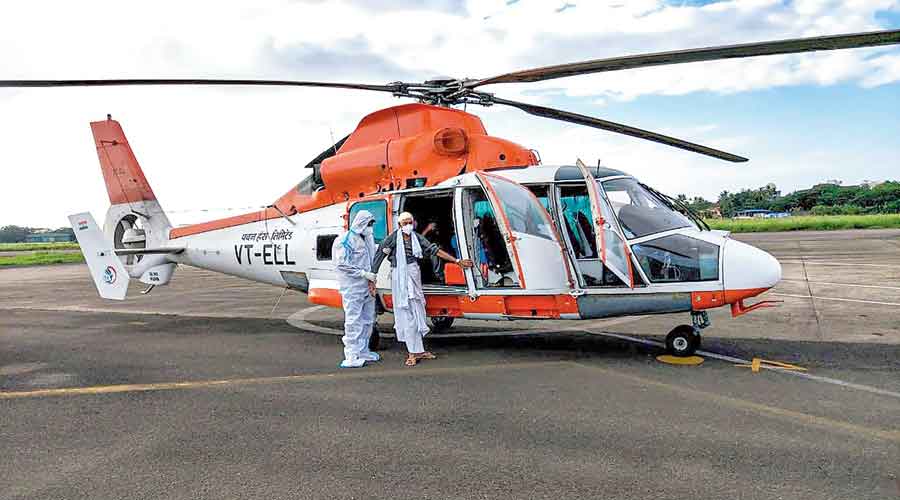Elected representatives of local bodies in capital Kavaratti on Tuesday met the Lakshadweep collector to seek relief materials such as food kits and also relaxation of the Covid-induced lockdown that has affected the livelihood of the poor who eke out a living by doing manual work.
There is a perception that the move not to ease the lockdown, which has been in place for over two months, despite a significant reduction in coronavirus cases was another attempt to harass residents at a time the islands’ administrator has been introducing one controversial law after another.
The 10 elected representatives met Kavaratti collector S. Asker Ali to air their concerns over the recent developments that have brought life to a standstill, especially after the lockdown was enforced.
“As an immediate step we urged the administration to provide financial assistance and free dry ration kits as people are literally starving with all their earning resources shut off,” district panchayat member Asif Ali told The Telegraph on Tuesday.
He said everyone on the islands had been hit badly by the lockdown that was extended by another week on Monday.
“Yesterday Kavaratti reported just 17 new Covid cases while the entire Lakshadweep had 38. The administration is continuing with the lockdown only to harass us for speaking out against them,” Asif Ali said.
With more than 40 per cent of the 68,000 people of Lakshadweep dependent on manual labour such as plucking coconuts and doing construction work, Asif Ali said they had been left with no income.
“They are surviving on handouts that some political parties and social organisations are providing. The administration has not given any food to these poor people,” he added.
The islanders had observed a 12-hour hunger strike on Monday to demand the recall of administrator Praful Khoda Patel and the withdrawal of his contentious reforms.
Kavaratti village panchayat member Thaha Malika of the Congress, who was part of the delegation that met the collector, said the officer had promised to “look into” their demands.
“He said he would look into our demands. But what we want is an immediate solution so that people can return to normal life,” Malika said, adding that the administration was citing Covid cases only as an excuse to keep people indoors.
“Since the collector gave us time, which was a surprise, we hope he will do something to address our concerns,” the Congress leader said.
The Telegraph could not contact collector Asker Ali despite repeated attempts.
Cleanliness diktat
The islanders have been informed about a set of new norms under the Swachh Lakshadweep Abhiyan. The fresh rules prohibit residents from keeping even fallen coconuts and coconut fronds on their land.
The notification dated June 4 states that it will be the duty of the residents to maintain cleanliness of their premises. “Tender coconut shell, tree trunks, coconut husk, coconut shell, trunks etc in and around dwelling places/public places must be disposed of scientifically,” it says.
Asif Ali, the district panchayat member, said: “We can understand the part where it is said that people are not allowed to dispose of waste materials in public places. But why our own land? Where else do we keep our coconut fronds and coconuts?” he asked.
Apart from tuna that’s fished, dried and sold by fishermen, coconut is the main produce of Lakshadweep, which is dotted with trees.
“Most people don’t have separate sheds to store coconuts and their fronds. Even those who have sheds leave the coconuts and fronds in the courtyard until they dry sufficiently to be stored. I see this as yet another order to harass the people,” Asif Ali said.
The arrival of administrator Patel in December changed life on the islands as he brought in one law after the other that went against the people and their traditions.
While beef has been pulled out of the midday meal menu in schools of Lakshadweep where a huge majority of people are Muslims categorised as Scheduled Tribes, the administration drafted a Goonda Act in a place with one of the lowest crime rates in the country, shuttered dairy farms, destroyed fishing infrastructure, brought in a two-child norm to contest elections, and decided to use Mangalore port in BJP-ruled Karnataka to ferry all essential cargo in place of Kozhikode and Kochi in Kerala that share much, including the language and culture, with the islanders.











